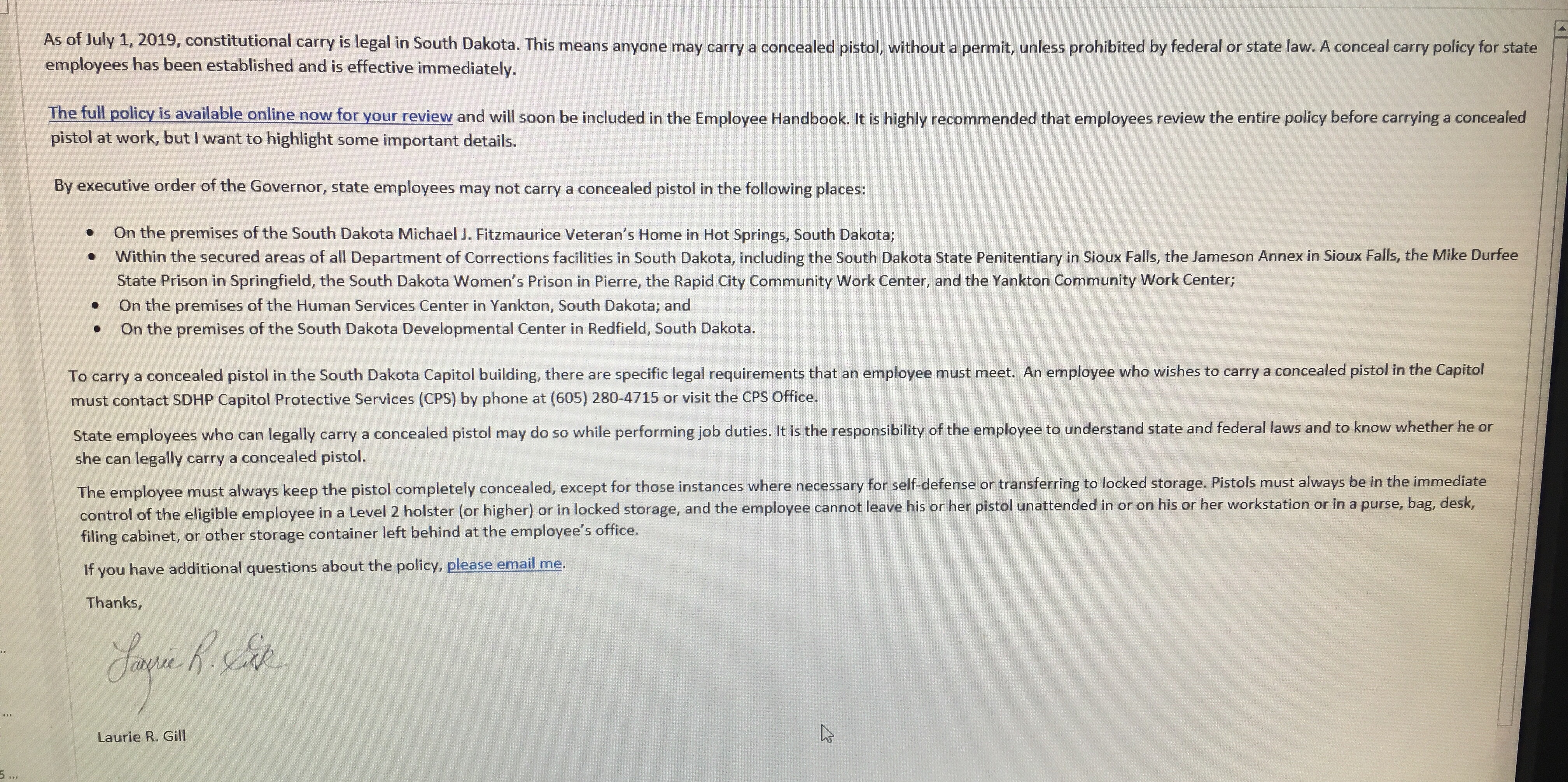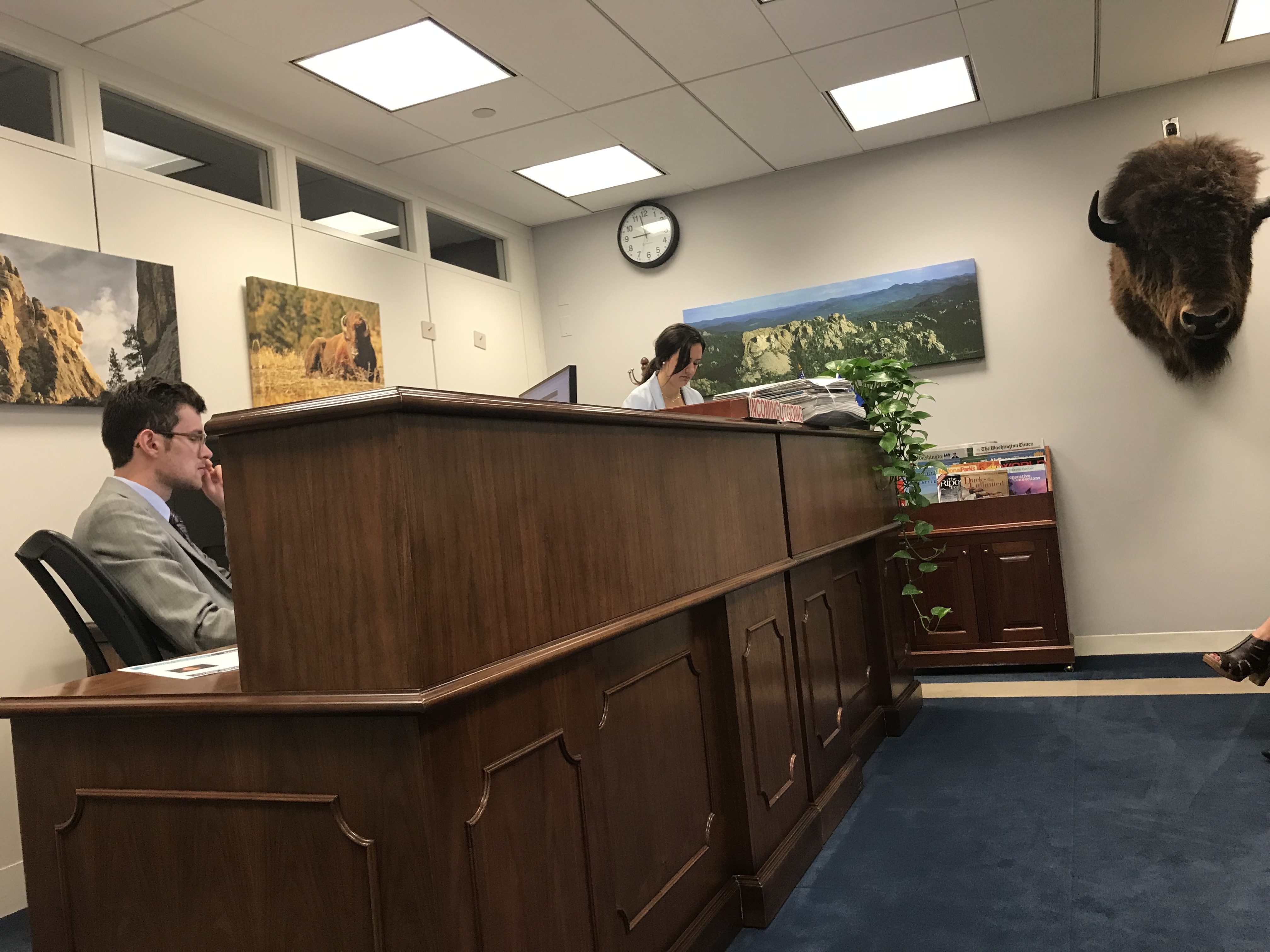Congratulations to Sen. Jordan and Mrs. Youngberg on the birth of their son

Congratulations to Republican State Senator Jordan Youngberg and his wife Ann on the birth of their son Russell William Youngberg. 4lbs 10 oz born on Saturday at 2:57 pm.

Congratulations to Republican State Senator Jordan Youngberg and his wife Ann on the birth of their son Russell William Youngberg. 4lbs 10 oz born on Saturday at 2:57 pm.
South Dakota Ends 2019 Budget Year with $19.4 Million Surplus
PIERRE, S.D. – Governor Kristi Noem today announced that South Dakota closed the 2019 budget year on June 30 with a $19.4 million surplus. The state general fund budget ended with lower expenditures than budgeted, while ongoing revenue finished lower than projected levels.
“In South Dakota, we don’t spend money we don’t have. We live within our means, and we operate in a way that doesn’t require us to raise taxes,” said Noem. “Once again, South Dakota is leading by example by finishing the fiscal year with a balanced budget. We are saving money for the future and ensuring that the next generation’s financial foundation remains strong. I am committed to maintaining the financial responsibility for which South Dakota has become known. We will remain rooted in fiscal integrity.”
Total spending for fiscal year 2019 was $23.1 million lower than budgeted, which includes $17.3 million of fiscal year 2019 general fund reversions and $5.8 million of unspent funds from special appropriations and carryover funding. Of the $17.3 million of 2019 general fund reversions, $15.3 million came from executive branch agencies, $1.0 million came from the Unified Judicial System, $0.7 million came from the Board of Regents, and $0.3 million came from the Legislature and constitutional offices. The unspent funds in fiscal year 2019 represent just 1.1 percent of the total fiscal year 2019 general fund budget.
Ongoing general fund revenue for fiscal year 2019 was lower than estimates adopted by the Legislature in February by $4.4 million, or 0.3 percent. Sales and use tax receipts are the state’s largest revenue source and grew by 3.7 percent over the prior fiscal year, but still finished the fiscal year $9.9 million below estimates. Other sources of general fund revenue finished the fiscal year above legislative estimates including bank franchise tax, unclaimed property receipts, and lottery.
“It’s still early, but it is prudent to have not budgeted for any additional sales and use tax from online and other remote sellers given the fact that this year’s overall sales tax numbers didn’t hit their projections,” concluded Noem. “We’ll continue to monitor the data coming to see how the Wayfair decision and the subsequent tax changes impact our state’s bottom line.”
By law, the fiscal year 2019 surplus of $19.4 million was transferred to the budget reserve fund. The state’s budget reserve fund now has a balance of $145.1 million and the general revenue replacement fund has a balance of $44.0 million, for a total reserve of $189.1 million.
###
The group which had submitted a plethora of ballot measures to the Legislative Research Council in recent weeks has added another measure to their plate – mandatory voter registration upon turning 18:
2020 IM Voter Registration LRCComments by Pat Powers on Scribd
The act demands that all branches of the government check voter registration when they interact with someone, and if they are not registered to vote, they submit their names for registration. And, all schools are to submit the names of students upon their turning 18.
Coming from the hard liberal group that wants to create its own political party, is it just me, or does this seem a bit ‘draconian?”
Where’s the freedom in this measure for people to choose NOT to register to vote, if they so choose? It’s not that far of a stretch from mandatory registration to the type of compulsory voting they had in the Soviet Union of old.
Would I like to see a higher voter registration and participation? Sure. Do I think we need compulsory laws mandating registration or voting?
Well, this was still the land of the free, last time I checked.
After getting back in state from Washington DC this past week, I got to spend yesterday driving across I-90 to Sturgis, where I’ll be based all week for a work conference for my day job.
Not much to report on politically from the drive, coming just under a year before the primary election. Although, someone along I-90 near New Underwood still has a massive sign with 2 4×8’s declaring their continuing support for Kristi Noem for Governor. (And that’s ok. Lots of us support Governor Noem!)
By this time next summer, primary elections will be over, and we’ll know if Democrats have been able to scratch up any candidates.
(Right now, it’s not looking good.)
Rounds Cosponsors Bill to Make RFS Small Refinery Waiver Process More Transparent
Bipartisan legislation would provide certainty for farmers and ethanol producers
WASHINGTON—U.S. Sen. Mike Rounds (R-S.D.) cosponsored the bipartisan RFS Integrity Act of 2019. This legislation seeks to provide more certainty for producers by bringing transparency and predictability to the Environmental Protection Agency’s (EPA) small refinery exemption process. The bill would require small refineries to petition for Renewable Fuel Standard (RFS) hardship exemptions by June 1st of each year. This change would make sure that EPA properly accounts for exempted gallons in the annual Renewable Volume Obligations it sets each November.
“South Dakota is a leader in corn ethanol production, and it is an important part of our state’s overall economy,” said Rounds. “The EPA needs to take into account the impact of small refinery waivers on the corn ethanol industry. These waivers have the potential to reduce corn ethanol demand which would hurt South Dakota producers at a time of low net farm income. Our bipartisan bill would provide much-needed transparency to the EPA’s waiver process.”
During a Senate Environment and Public Works Committee hearing last year, Rounds questioned then-Acting EPA Administrator Andrew Wheeler about the number of small refinery waivers issued by the agency, asking why the EPA takes care of small refineries but not small farmers. To view their exchange, clickHERE. During Wheeler’s confirmation hearing this year, Rounds again pressed him on the issue of exemptions granted to small refineries.
The RFS Integrity Act of 2019 was originally introduced by Sens. Deb Fischer (R-Neb.) and Tammy Duckworth (D-Ill.) Companion legislation has been introduced in the House of Representatives. The bill is supported by a number of organizations including the National Corn Growers Association, the Renewable Fuels Association, the National Biodiesel Board and the American Coalition for Ethanol.
###
From my mailbox, the SD Bureau of Personnel has issued guidelines for state employees to carry a concealed weapon while on the job…

And actually, the position taken by the state of SD for its own employees appears entirely reasonable.
Don’t carry at the HSC, don’t carry at the state pen, keep your gun in your possession, etc.
The policy seems well thought out in terms of the reach of the law, as well as protecting employees and the people they interact with.
Any thoughts?
First thing this AM, I’m hanging out in Sen Mike Rounds’ outer office while my wife waits to meet with a member of his education staff:

I did have a nice chat with Mike’s staff, who note that the Senator is back in the office this AM, and that his wife Jean has been responding well to her first round of cancer treatment.
(There were people actually scheduled and waiting to see Mike, as opposed to me just bumbling in, so I wasn’t going to try to sneak in and see him unannounced.)
… and actually, I did get to greet Mike as my wife finished up. It was great to chat for a moment, and it sounds like everyone is doing well.
From opensecrets.org:
A trade group representing chemical companies will spend more than $150,000 on advertising during July in support of four Republican senators and one Democrat, all of whom face reelection in 2020.
The American Chemistry Council, which represents nearly 200 companies including DuPont, Chevron Phillips and ExxonMobil, is running TV and radio ads in Alaska, Delaware, Louisiana, Montana and South Dakota between July 8 and 21, according to Federal Communications Commission records accessed via OpenSecrets’ political ad database. Sens. Dan Sullivan (R-Alaska), Chris Coons (D-Del.), Bill Cassidy (R-La.), Steve Daines (R-Mont.) and Mike Rounds (R-S.D.) all face reelection next year.
Noem Names Interim Commissioner of Human Resources
PIERRE, S.D. – Governor Kristi Noem today announced that Thomas Steckel will serve as Interim Commissioner of the Bureau of Human Resources (BHR). This follows the appointment of current BHR Commissioner Laurie Gill as Secretary of Social Services. Steckel’s appointment is effective July 9, 2019.
“Tom has been a critical part of the leadership team at the Bureau of Human Resources,” saidNoem. “I’m grateful for his willingness to lead during this interim period.”
“The Bureau of Human Resources plays an integral role in ensuring the continued success of state government,” said Steckel. “I look forward to working with Governor Noem as we continue supporting state employees and making the state a premier place to work.”
Steckel currently serves as director of employee benefits within BHR, a position he has held since 2014. In this role, he has managed the budget and execution of the State Employee Health Plan program and worker’s compensation program.
###
After the torrential rains which doused our nation’s capital city, flooding some areas, it broke long enough for me to visit the National Portrait Gallery.
However, fearing the possible return of inclement weather, I have sought the refuge of the Dubliner, a tavern of fine reputation for weary denizens who frequent the hill.

I shall endeavor to hold out as long as the threat of precipitation persists, and supplies of fish & chips hold out.
(Or at least while the live music is still going)